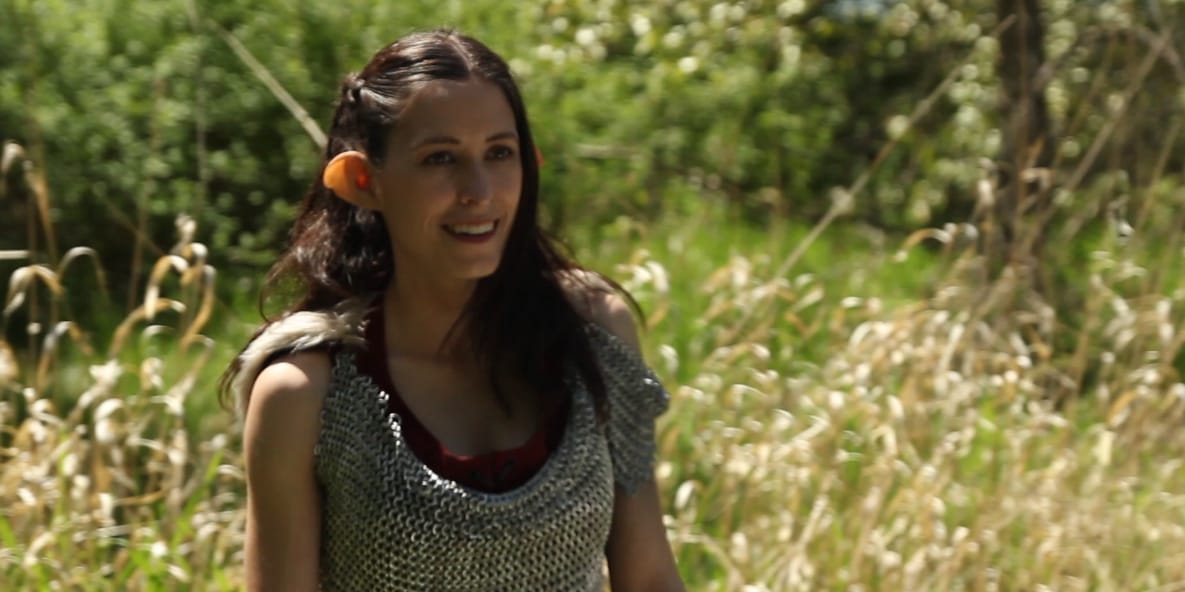Joanna Gaskell is originally from Victoria, Canada. She is the producer and the writer of Standard Action, and plays Edda the Elf Barbarian. You can see her in the board game review series Starlit Citadel Reviews, catch her in the upcoming Gamers: Hands of Fate movie, hear her voice in new animated TV show Animism, and watch her on stage at the Critical Hit Show – live D&D improv in Vancouver. Her favourite colour is orange, she loves playing Patfhinder, and she wants to grow up to be a Jedi.
In this guest post Joanna shares her top 5 lessons learnt as a webseries producer in the nerd world. To get started with Standard Action begin with Episode 1 – The Barbarian which introduces Edda or find out how to get involved with series 3.
Top 5 lessons I learned as a webseries producer in the nerd world
I do a lot of stuff on Standard Action. I act, I write, I make sandwiches, I drive people around, I build props sometimes, I run the camera sometimes, I cast, I schedule, and I edit… and there’s more. Because of this vast number of tasks that I’ve taken on for the show, I’ve obviously learned an awful lot – too much to talk about in one article!
So, for this piece, I’m going to try to streamline, and just focus on the things I learned that relate to creating a webseries for a geek audience. There have been countless numbers of webseries that have popped up over the last few years, and many of them are appealing to a niche, genre or “nerdy” audience. As a part of that movement, here’s what I learned.
1. Nerds cannot get enough content. When I was first starting out in webseries, I was coming from an independent and professional film/tv/media background, and embedded in that world is the inevitable competition between you and whoever else is out there making cool stuff. It sucks, actually. There will be a bunch of amazing filmmakers all making great films, and they will all find themselves in competition with each other for a coveted spot in a film festival. Or, several fantastic actors will go head-to-head over the same role, and end up bitter towards the one who succeeds.
One amazing thing about webseries, and specifically webseries content built for a nerdy or niche audience, is that the audience can’t get enough. When you’re a webseries, you don’t complete for timeslots or festivals in order to be seen by your audience, you’re just out there, for free, available to enjoy any time, anywhere. There’s no way our team, as one force for filmmaking good, could ever make enough content to fill everyone’s time, so there’s no good reason for anyone in the webseries community to be in competition with each other. If your audience loves you, they will keep watching. That’s your only metric. It follows, then, that there’s also no reason for webseries not to be supportive of each other, and help each other out when they can. Together we create a strong, web-based media presence. This brings me to my next point.
2. Nerds live online. It’s true! We do. Making a nerdy webseries is a no-brainer! Your audience is already used to having entertainment delivered to them through a computer screen or a mobile device, and this is where your series is going to be. It’s a natural move for people who love nerdy entertainment to go from TV to completely web-based programming, Why not? They are a willing, generous audience hungry for content about the things they love.
Stop thinking mainstream – don’t worry so much about newspapers or peppering the street with posters, or screenings in a theatre. Your audience is international, and online! Go out and engage them on common ground – if you want to get people discovering and watching your content, go to them. Join the forums full of people who share your interests; use social media until it becomes second-nature. Above all, learn the rules. Do NOT barge in on people’s forums and advertise your stuff without knowing the audience and the conversation. Do NOT spam people on Twitter. There’s no better way to get your stuff purposefully ignored.
3. Do not underestimate the intelligence of your audience. Sure, we all love cat videos. And if you look at the vast majority of stuff on YouTube, you’d likely be convinced that the only way you’ll get a loyal following is by playing to the lowest common denominator. Not true! Most geeks are smart people who appreciate a good story.
People who become fans of a series or show or comic or artist do so because something about the object of their fandom fascinates them. They appreciate complexity, and if they appreciate what you do and the stories you tell, they’ll stick with you when you decide to throw them curveballs. In fact, they’ll eat it up! Don’t babysit your audience, challenge them! And if a few of them get lost, usually the others in the audience will help them along.
4. Don’t sell yourself short. If you created something – actually took it through the planning process, through production, and then polished it off, put down your tools and put it on display, you have done something incredibly courageous, and rare. Very few people who start a project finish it, and if you manage to pull it off, do not sell yourself short! This is an incredible achievement!
For every supportive nerd out there, there will be a grumpy nerd who complains that you didn’t get the rules for grappling right in your show, or that your continuity was off between one shot and the next, or that fireball just doesn’t work like that. Do your best to brush that stuff off and move forward. Your first project isn’t going to turn out exactly the way you want it to. (In fact, I suspect no project ever does.) But the first project leads to the second project, and pretty soon you’re learning more than you ever thought possible.
5. Make stuff you like. This is so important. Make stuff you laugh at, or are captivated by, or want to watch. If you love it, chances are other people will too, and it’s SO much easier to make something you honestly enjoy. There are too many projects these days that target “Nerd Culture” as a market to be exploited. But the thing is… we nerds KNOW when you’re faking it. We know when a bunch of suits have gotten together in a room and decided on the best way to make something nerds will buy. We see through you, non-nerdy businessmen. But if you make something you love, we can see your heart and soul in it. I could try to make a Doctor-Who-inspired show. But you know who could do it better? Someone who lives and breathes Doctor Who fandom. Then all the other Who-fans out there would know it and see it for what it is, and love it along with them.
At the time of posting Standard Action has an active Kickstarter, that’s met funding goal but still open for nerds to get involved. Geek Native talked to Joanna about the rise of the webseries earlier this week.


